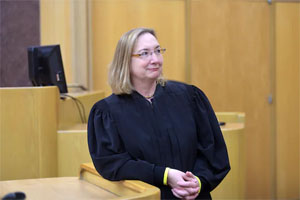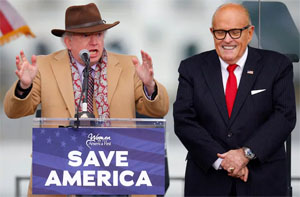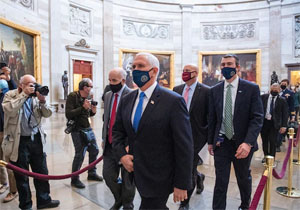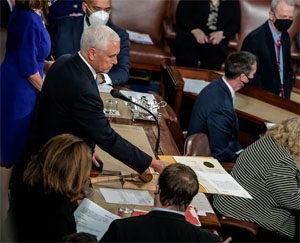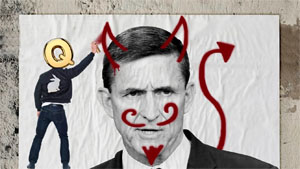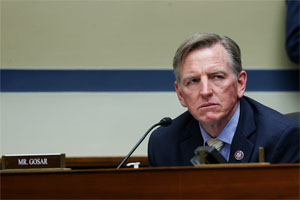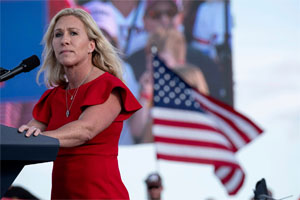Part 1 of 2
Memorandum Opinion Re Donald Trump vs. Bennie G. Thompson, U.S. House Select Cmte. to Investigate the Jan. 6 Attackby USDC Judge Tanya S. Chutkan
November 9, 2021
UNITED STATES DISTRICT COURT
FOR THE DISTRICT OF COLUMBIA
DONALD J. TRUMP,
Plaintiff,
v.
BENNIE G. THOMPSON, in his official capacity as Chairman of the United States House Select Committee to Investigate the January 6th Attack on the United States Capitol, et al.,
Defendants.
Civil Action No. 21-cv-2769 (TSC)
MEMORANDUM OPINIONOn January 6, 2021, hundreds of rioters converged on the U.S. Capitol. They scaled walls, demolished barricades, and smashed windows in a violent attempt to gain control of the building and stop the certification of the 2020 presidential election results. This unprecedented attempt to prevent the lawful transfer of power from one administration to the next caused property damage, injuries, and death, and for the first time since the election of 1860, the transfer of executive power was distinctly not peaceful.
The question of how that day’s events came about and who was responsible for them is not before the court. Instead, the present dispute involves purely legal questions that, though difficult and important to our government’s functioning, are comparatively narrow in scope. Plaintiff—former President Donald J. Trump—challenges the legality of a U.S. House of Representatives Select Committee’s requests for certain records maintained by the National Archives and Records Administration (“NARA”) pursuant to the Presidential Records Act. Plaintiff argues that the Committee’s requests are impermissible because at least some of the records sought are shielded by executive privilege and because the requests exceed Congress’ constitutional power. He seeks an injunction prohibiting Defendants—the House Select Committee, the Chairman of the House Select Committee, NARA, and the Archivist of NARA—from enforcing or complying with the Committee’s requests. For the reasons explained below, the court will deny Plaintiff’s requested relief.
I. BACKGROUND
A. The 2020 Presidential Election and January 6, 2021While not material to the outcome, some factual background on the events leading up to and including January 6, 2021, offers context for the legal dispute here. In the months preceding the 2020 presidential election, Plaintiff declared that the only way he could lose would be if the election were “rigged.” See, e.g., Donald J. Trump, Speech at Republican National Convention Nomination Vote at 22:08 (Aug. 24, 2020) in C-SPAN,
https://www.c-span.org/video/?475000-10 ... ntion-vote. In the months after losing the election, he repeatedly claimed that the election was rigged, stolen, and fraudulent. For example, in a December 2 speech, he alleged “tremendous voter fraud and irregularities” resulting from a late-night “massive dump” of votes. See President Donald J. Trump, Statement on 2020 Election Results at 0:39, 7:26 (Dec. 2, 2020) in C-SPAN,
https://www.c-span.org/video/?506975-1/ ... on-results. He also claimed that certain votes were “counted in foreign countries,” that “millions of votes were cast illegally in the swing states alone,” and that it was “statistically impossible” he lost. Id. at 12:00, 14:22, 19:00.
After losing the election, Plaintiff and his supporters filed a plethora of unsuccessful lawsuits seeking to overturn the results. See, e.g., Current Litigation, AMERICAN BAR ASSOCIATION: STANDING COMMITTEE ON ELECTION LAW, Apr. 30, 2021,
https://www.americanbar.org/groups/publ ... itigation/. The United States Supreme Court also denied numerous emergency applications aimed at overturning the results. Id. In response, Plaintiff tweeted that the Court was “totally incompetent and weak on the massive Election Fraud that took place in the 2020 Presidential Election.” Donald J. Trump (@realDonaldTrump), TWITTER (Dec. 26, 2020, 1:51 PM),
https://www.presidency.ucsb.edu/documen ... -26-2020.1 [1 Plaintiff was permanently suspended from Twitter on January 8, 2021. See Press Release, Twitter, Inc., Permanent Suspension of @realDonaldTrump (Jan. 8, 2021),
https://blog. twitter.com/en_us/topics/company/2020/suspension. As a result, Plaintiff’s tweets are permanently unavailable in their original form. See Quint Forgey, National Archives can’t resurrect Trump’s tweets, Twitter says, POLITICO (Apr. 7, 2021),
https://www.politico.com/news/2021/04/0 ... ump-479743. The court has relied on the University of California, Santa Barbara’s The American Presidency Project for archived tweets. See John Wolley & Gerhard Peters, THE AMERICAN PRESIDENCY PROJECT,
https://www.presidency.ucsb.edu/.] He continued his claim that “We won the Presidential Election, by a lot,” and implored Republicans to “FIGHT FOR IT. Don’t let them take it away.” Id. (Dec. 18, 2020, 2:14 PM),
https://www.presidency.ucsb.edu/documen ... er-18-2020.
A Joint Session of Congress was scheduled to convene on January 6, 2021, to count the electoral votes of the 2020 presidential election and to officially announce the elected President, as required by the Twelfth Amendment to the U.S. Constitution and the Electoral Count Act, 3 U.S.C. § 15. In the days leading up to January 6, Plaintiff began promoting a protest rally to take place hours before the Joint Session convened. On December 19, 2020, he tweeted “Statistically impossible to have lost the 2020 Election. Big protest in D.C. on January 6th. Be there, will be wild!” Donald J. Trump (@realDonaldTrump), TWITTER (December 19, 2020, 6:42am),
https://www.presidency.ucsb.edu/documen ... er-19-2020. During a rally, he warned that “Democrats are trying to steal the White House . . . you can’t let that happen. You can’t let it happen,” and promised that “[w]e’re going to fight like hell, I’ll tell you right now.” See Donald J. Trump, Remarks at Georgia U.S. Senate Campaign Event at 8:40, 14:19 (Jan. 4, 2021) in Campaign 2020, C-SPAN,
https://www.c-span.org/video/?507634-1/ ... es-georgia.
On January 6, Plaintiff spoke at the rally at the Ellipse, during which he (1) repeated claims, rejected by numerous courts, that the election was “rigged” and “stolen”; (2) urged then-Vice President Pence, who was preparing to convene Congress to tally the electoral votes, “to do the right thing” by rejecting certain states’ electors and declining to certify the election for President Joseph R. Biden; and (3) told protesters to “walk down to the Capitol” to “give them the kind of pride and boldness that they need to take back our country,” “we fight. We fight like hell. And if you don’t fight like hell, you’re not going to have a country anymore,” and “you’ll never take back our country with weakness.” See Donald J. Trump, Rally on Electoral College Vote Certification at 3:33:04, 3:33:36, 3:37:20, 3:47:02, 3:47:22, 4:42:26, 4:41:27 (Jan. 6, 2021) in Campaign 2020, C-SPAN,
https://www.c-span.org/video/?507744-1/ ... tification.
Shortly thereafter, the crowds surged from the rally, marched along Constitution Avenue, and commenced their siege of the Capitol.
B. The Select Committee and its Presidential Records Act RequestOn June 30, 2021, the U.S. House of Representatives passed House Resolution 503, creating the Select Committee. ECF No. 5, Pl. Mot., Ex. 3, H.R. 503, § 3, 117th Cong. (2021). H.R. 503 empowers the Select Committee to (1) “investigate the facts, circumstances, and causes relating to” the January 6 attack; (2) “identify, review, and evaluate the causes of and the lessons learned from” the attack; and (3) “issue a final report to the House containing such findings, conclusions, and recommendations for corrective measures . . . as it may deem necessary.” Id. § 4(a). Such corrective measures may include:
[C]hanges in law, policy, procedures, rules, or regulations that could be taken— (1) to prevent future acts of violence, domestic terrorism, and domestic violent extremism, including acts targeted at American democratic institutions; (2) to improve the security posture of the United States Capitol Complex while preserving accessibility of the Capitol Complex for all Americans; and (3) to strengthen the security and resilience of the United States and American democratic institutions against violence, domestic terrorism, and domestic violent extremism.
Id. § 4(c). The resolution also authorizes the Select Committee to publish interim reports, which may include “legislative recommendations as it may deem advisable.” Id. § 4(b).
The Select Committee is authorized “to require, by subpoena or otherwise, the attendance and testimony of such witnesses and the production of books, records, correspondence, memoranda, papers, and documents as it considers necessary.” 47 Rule XI.2(m)(1)(B), Rules of the U.S. House of Rep., 117th Cong. (2021) (“House Rules”); see also H.R. 503, § 5(c) (unless otherwise specified, Rule XI applies to the Select Committee). Under House Rule XI:
Subpoenas for documents or testimony may be issued to any person or entity, whether governmental, public, or private, within the United States, including, but not limited to, the President, and the Vice President, whether current or former, in a personal or official capacity, as well as the White House, the Office of the President, the Executive Office of the President, and any individual currently or formerly employed in the White House, Office of the President, or Executive Office of the President.
House Rule XI.2(m)(3)(D).
On August 25, 2021, pursuant to section 2205(2)(C) of the Presidential Records Act (“PRA”), the Committee issued a document request to NARA seeking several categories of records from the Executive Office of the President and the Office of the Vice President. Compl., Ex. 1. Specifically, the Select Committee sought written communications, calendar entries, videos, photographs, or other media relating to Plaintiff’s January 6 speech, the January 6 rally and subsequent march, the violence at the Capitol, and the response within the White House. See id. at 2-4. The Committee also requested materials from specific time periods relating to any planning by the White House and others regarding the January 6 electoral count, id. at 4-7; preparations for rallies leading up to the January 6 violence, id. at 7-8; information Plaintiff received regarding the election outcome, id. at 9-10; Plaintiff’s public remarks regarding the election outcome and the validity of the election system more broadly, id.; and for a specified timeframe surrounding the 2020 election, documents and communications of the Plaintiff and certain of his advisors relating to the transfer of power and obligation to follow the rule of law, including with respect to actual or potential changes in personnel at certain executive branch agencies, and relating to foreign influence in that election, id. at 10-12. These requests are the subject of this lawsuit.
C. Presidential Records in the Nixon EraIn the wake of its investigation of presidential wrongdoing in the Watergate scandal, Congress passed two laws relating to presidential records. The first was the Presidential Recordings and Materials Preservation Act of 1974 (“PRMPA”), enacted after former President Richard Nixon indicated that he intended to destroy certain tape recordings of his conversations while in office.
Four years later, after the Supreme Court’s ruling in Nixon v. Adm’r of Gen. Servs. (Nixon v. GSA), 433 U.S. 425, 448 (1977),2 [2 See discussion infra at § III.A.1.ii.a.] Congress passed the PRA, which changed the legal ownership of the President’s official records from private to public, and established a new statutory scheme under which Presidents, and NARA, must manage the records of their Administrations. In passing the PRA, Congress sought a balance between, on the one hand, “encourag[ing] the free flow of ideas within the executive branch” by allowing a President to restrict access to their Presidential records for up to twelve years after their tenure ends, and on the other hand, permitting Congress to access any records it needs to conduct its business before the twelve-year clock runs. See, e.g., 95 Cong. Rec. H34895 (daily ed. Oct. 10, 1978) (statement of Rep. Brademas); see also 95 Cong. Rec. S36845 (daily ed. Oct. 13, 1978) (statement of Sen. Nelson) (explaining that the legislation was “carefully drawn” to strike a balance between the confidentiality of the President’s decision-making process and the public interest in preservation of the records).
The PRA defines “Presidential records” as records reflecting “the activities, deliberations, decisions, and policies” of the Presidency. 44 U.S.C. § 2203(a). Under the Act, when a President leaves office, the Archivist “assume[s] responsibility for the custody, control, and preservation of, and access to” the Presidential records of the departing administration. Id. § 2203(g)(1). The Archivist must make Presidential records available to the public under the Freedom of Information Act five years after the President leaves office. Id. § 2204(b)(2), (c)(1); see also 36 C.F.R. § 1270.38. However, the outgoing President can restrict access to especially sensitive materials for a period of up to 12 years. 44 U.S.C. § 2204(a); see also 36 C.F.R. § 1270.40(a). One exception is that “Presidential records shall be made available . . . to either House of Congress, or, to the extent of matter within its jurisdiction, to any committee or subcommittee thereof if such records contain information that is needed for the conduct of its business and that is not otherwise available.” 44 U.S.C. § 2205(2)(C).
The PRA gives the Archivist the power to promulgate regulations to administer the statute. 44 U.S.C. § 2206. Pursuant to those regulations, the Archivist must promptly notify both the former President as well as the incumbent President of a request for the former President’s records. See 36 C.F.R. § 1270.44(c). Either the former or incumbent President “may assert a claim of constitutionally based privilege” against disclosure within thirty calendar days after the date of the Archivist’s notice. Id. § 1270.44(d). If a former President asserts the claim, the Archivist consults with the incumbent President as soon as practicable and within 30 calendar days from the date that the Archivist receives notice of the claim to determine whether the incumbent President will uphold the claim. Id. § 1270.44(f)(1). If the incumbent President does not uphold the former President’s claim, the Archivist must disclose the Presidential records 60 calendar days after receiving notification of the claim unless a federal court order directs the Archivist to withhold the records. Id. § 1270.44(f)(3); see also Exec. Order No. 13489, § 4(b) (providing that the Archivist shall abide by the incumbent President’s determination as to a privilege assertion by a former President unless otherwise directed by a final court order). The Archivist may also “adjust any time period or deadline . . . to accommodate records requested.” 36 C.F.R. § 1270.44(g).
D. Response to Select Committee’s RequestOn August 30, 2021, after receiving the Select Committee’s requests, the Archivist notified Plaintiff that NARA intended to produce a first tranche of approximately 136 pages of records responsive to the Committee’s requests. ECF No. 21, NARA Br. at 11.
On October 8, 2021, White House Counsel notified the Archivist that President Biden would not be asserting executive privilege over the first tranche of Presidential records because doing so “is not in the best interests of the United States.” Pl. Mot., Ex. 4 at 1. Counsel further explained the President’s position:
Congress has a compelling need in service of its legislative functions to understand the circumstances that led to these horrific events. . . . The Documents shed light on events within the White House on and about January 6 and bear on the Select Committee’s need to understand the facts underlying the most serious attack on the operations of the Federal Government since the Civil War. These are unique and extraordinary circumstances. . . . The constitutional protections of executive privilege should not be used to shield, from Congress or the public, information that reflects a clear and apparent effort to subvert the Constitution itself.
Id. at 1-2.
That same day, Plaintiff notified the Archivist that he was asserting executive privilege with respect to thirty-nine pages of records in the first tranche, and seven pages of records that were subsequently withdrawn from the first tranche as non-responsive. NARA Br. at 11. Plaintiff also made a “protective assertion of constitutionally based privilege with respect to all additional records following the First Tranche.” Pl. Mot., Ex. 5 at 2.
White House Counsel then notified the Archivist that President Biden “does not uphold the former President’s assertion of privilege.” Pl. Mot., Ex. 6. Counsel further instructed the Archivist to turn the requested records over to the Committee thirty days after the Archivist notified Plaintiff, absent an intervening court order, “in light of the urgency of the Select Committee’s need” for the requested records. Id.
On October 13, 2021, the Archivist notified Plaintiff that, “[a]fter consultation with Counsel to the President and the Acting Assistant Attorney General for the Office of Legal Counsel, and as instructed by President Biden,” the Archivist “determined to disclose to the Select Committee,” on November 12, 2021, all responsive records that President Trump determined were subject to executive privilege, absent an intervening court order. Id., Ex. 7.3 [3 On the same date, the Archivist produced to the Select Committee the ninety pages of records in the first tranche that were both responsive to the Committee’s requests and not subject to Plaintiff’s assertions of privilege. NARA Br., Laster Decl. ¶ 20.]
The review and submission process for additional tranches of records is proceeding on staggered timelines. Regarding the second and third tranches of records, NARA notified Plaintiff and President Biden on September 9 and 16 that it was planning to disclose 888 pages of additional records, three of which NARA later withdrew because they were not Presidential records. NARA Br. at 11-12. Plaintiff asserted privilege over 724 pages. Id. at 12. President Biden again responded that he would not uphold the privilege. Id. NARA notified Plaintiff and President Biden that it would turn over the 724 pages to the Committee on November 26 absent an intervening court order. Id. On October 15, NARA sent notification of its intent to disclose a fourth tranche of 551 pages of responsive records. Id. The review period for the fourth tranche is ongoing, and NARA anticipates that it will identify additional tranches of responsive records on a rolling basis. Id.
E. Procedural HistoryOn October 18, Plaintiff filed this action, seeking a declaratory judgment that the Select Committee’s requests are invalid and unenforceable, an injunction against the Congressional Defendants’ enforcement of the requests or use of any information obtained via the requests, and an injunction preventing the Archivist and NARA’s production of the requested information. See ECF No. 1, Compl. at 25-26. The following day, Plaintiff moved for a preliminary injunction “prohibiting Defendants from enforcing or complying with the Committee’s request.” Pl. Mot. at 3. At the parties’ request, the court set an accelerated briefing schedule and heard argument on the motion on November 4, 2021. See Min. Order (Oct. 22, 2021).
On November 8, 2021, Plaintiff filed a preemptive emergency motion requesting an injunction pending appeal, or an administrative injunction, “should the court refuse” to grant his requested relief. ECF No. 34, at 1. The court denied Plaintiff’s emergency motion without prejudice as premature and stated that the court would consider a motion for a stay from the non-prevailing party following its ruling. See Min. Order (Nov. 9, 2021) (citing Fed. R. Civ. P. 62(d)).
II. LEGAL STANDARDA preliminary injunction is an “extraordinary” remedy that “should be granted only when the party seeking the relief, by a clear showing, carries the burden of persuasion.” Cobell v. Norton, 391 F.3d 251, 258 (D.C. Cir. 2004). To prevail on a motion for preliminary injunction, the movant bears the burden of showing that: (1) “he is likely to succeed on the merits”; (2) “he is likely to suffer irreparable harm in the absence of preliminary relief”; (3) “the balance of equities tips in his favor”; and (4) “an injunction is in the public interest.” Winter v. Nat. Res. Def. Council, Inc., 555 U.S. 7, 20 (2008). Where the federal government is the opposing party, the balance of equities and public interest factors merge. See Nken v. Holder, 556 U.S. 418, 435 (2009). In the past, courts in this jurisdiction have evaluated the four preliminary injunction factors on a “sliding scale”— a particularly strong showing in one factor could outweigh weakness in another. Sherley v. Sebelius, 644 F.3d 388, 393 (D.C. Cir. 2011). However, it is unclear if this approach has survived the Supreme Court’s decision in Winter. See, e.g., Banks v. Booth, 459 F. Supp. 3d 143, 149-50 (D.D.C. 2020) (citing Sherley, 644 F.3d at 393 (D.C. Cir. 2011)). Despite this uncertainty, each factor must still be present. Thus, if a party makes no showing of irreparable injury, the court may deny the motion for injunctive relief on that basis alone. See Save Jobs USA v. U.S. Dep’t of Homeland Sec., 105 F. Supp. 3d 108, 112 (D.D.C. 2015) (citing CityFed Fin. Corp. v. Off. of Thrift Supervision, 58 F.3d 738, 747 (D.C. Cir. 1995)).
III. ANALYSIS
A. Likelihood of Success on the Merits
1. Executive PrivilegeThis case presents the first instance since enactment of the PRA in which a former President asserts executive privilege over records for which the sitting President has refused to assert executive privilege. Plaintiff argues that at least some of the requested records reflect his decision-making and deliberations, as well as the decision-making of executive officials generally, and that those records should remain confidential. Specifically, Plaintiff claims such records fall within two constitutionally recognized categories of executive privilege—the presidential communications privilege and deliberative process privilege—and that he can prevent their disclosure. He argues that his power to do so extends beyond his tenure in Office, in perpetuity, and that his assertion of privilege is binding on the current executive branch. Plaintiff also argues that to the extent the PRA constrains his ability to assert executive privilege, the Act is unconstitutional. In the alternative, he contends that when a former President and current President disagree about whether to assert privilege, a court must examine each disputed document and decide whether it is privileged.
Defendants acknowledge that executive privilege may extend beyond a President’s tenure in office, but they emphasize that the privilege exists to protect the executive branch, not an individual. Therefore, they argue, the incumbent President—not a former President—is best positioned to evaluate the long-term interests of the executive branch and to balance the benefits of disclosure against any effect on the on the ability of future executive branch advisors to provide full and frank advice. The court agrees.
i. The Executive Power and the Origins of Executive PrivilegeThe Constitution vests all “executive Power” in the President, who “must ‘take Care that the Laws be faithfully executed.’” Seila Law LLC v. Consumer Fin. Prot. Bureau, 140 S. Ct. 2183, 2191 (2020) (quoting U.S. Const. art. II, § 1, cl. 1 & § 3)). Only the “incumbent is charged with performance of the executive duty under the Constitution.” Nixon v. GSA, 433 U.S. at 448. It is the incumbent President who is best situated to protect executive branch interests; the incumbent has “the information and attendant duty of executing the laws in the light of current facts and circumstances.” Dellums v. Powell, 561 F.2d 242, 247 (D.C. Cir. 1977). And only the incumbent remains subject to “political checks against . . . abuse” of that power. Nixon v. GSA, 433 U.S. at 448.
The Constitution does not expressly define a President’s right to confidential communications. The executive privilege “derives from the supremacy of the Executive Branch within its assigned area of constitutional responsibility.” Id. at 447. Indeed, as far back as George Washington’s presidency, it has been established that Presidents may “exercise a discretion” over disclosures to Congress, “communicat[ing] such papers as the public good would permit” and “refus[ing]” the rest. Trump v. Mazars USA, LLP (Mazars), 140 S. Ct. 2019, 2029-30 (2020) (quoting 1 Writings of Thomas Jefferson 189-90 (P. Ford ed. 1892)). The notion of executive privilege is “inextricably rooted in the separation of powers under the Constitution,” and is meant to protect the President’s ability to have full and unfettered discussions with advisors, liberated by the veil of confidentiality. United States v. Nixon, 418 U.S. 683, 708 (1974). The privilege “belongs to the Government and must be asserted by it: it can neither be claimed nor waived by a private party.” United States v. Reynolds, 345 U.S. 1, 7 (1953).
Presidential conversations are presumptively privileged, but the privilege is not absolute. Nixon v. GSA, 433 U.S. at 447. It exists for the benefit of the Republic, not any individual, and accordingly, the presumption can be overcome by an appropriate showing of public need by the judicial or legislative branch. See, e.g., Nixon v. GSA, 433 U.S. at 447, 449; Nixon, 418 U.S. at 707; Senate Select Committee on Presidential Campaign Activities v. Nixon (Senate Select Committee), 498 F.2d 725, 730 (D.C. Cir. 1974).
a) Senate Select CommitteeIn 1973, a special committee of the Senate was formed to investigate “illegal, improper or unethical activities” occurring in connection with then-President Nixon’s presidential campaign and election of 1972. Senate Select Comm., 498 F.2d at 726. The committee issued a subpoena to Nixon for tape recordings of his conversations with White House Counsel; in response, Nixon invoked executive privilege. See id. at 727. The D.C. Circuit noted that presidential conversations are presumptively privileged, and that the “presumption can be overcome only by an appropriate showing of public need.” Id. at 730. Weighing these two principles, the court held that the committee had not overcome the presumption of privilege because it had not shown that the tapes were “demonstrably critical” to its investigation. Id. at 731. The court explained that because the House Committee on the Judiciary already had access to copies of the tapes, the special committee’s stated interest was “merely cumulative” and not sufficient to overcome the presumption favoring confidentiality. Id. at 732.
ii. Former President’s Ability to Assert Privilege
a) Nixon v. GSAIn 1974, shortly after he resigned from office, former President Nixon indicated that he intended to destroy tape recordings he made during his presidency. See Nixon v. GSA, 433 U.S. at 432. The legislative and executive branches, recognizing the public interest in such materials, intervened. Congress enacted, and President Ford signed, the PRMPA, to give custody of Nixon’s records to the National Archives and to prohibit the destruction of the tapes or any other presidential materials. See H.R. Rep. No. 95-1487 at 5 (1978). Nixon sued, arguing that the PRMPA violated the separation of powers, presidential privilege, and several personal rights. Nixon v. GSA, 433 U.S. at 439-55. The Supreme Court rejected each of his arguments, holding that the PRMPA was constitutional on its face. As to the separation of powers, the Court noted that the “Executive Branch became a party to the Act’s regulation when President Ford signed the Act into law, and the administration of President Carter . . . vigorously supports . . . sustaining its constitutionality.” Id. at 441. The Court further explained that “in determining whether the Act disrupts the proper balance between the coordinate branches, the proper inquiry focuses on the extent to which it prevents the Executive Branch from accomplishing its constitutionally assigned functions.” Id. at 443 (citing Nixon, 418 U.S. at 711-12).
The Supreme Court also examined whether Nixon could assert privilege over his presidential records and prevent their disclosure to the Archivist. It found, as a threshold matter, that the privilege survives the end of a President’s tenure in office. Id. at 449. The Court explained that the basis for the privilege—to allow the President and his advisors the assurance of confidentiality in order to have full and frank discussions—“cannot be measured by the few months or years between the submission of the information and the end of the President’s tenure.” Id. It concluded that the privilege exists for the benefit of the Republic and is not tied to any one individual, and therefore survives the end of a President’s term. Id.
But the Court also found that “to the extent that the privilege serves as a shield for executive officials against burdensome requests for information which might interfere with the proper performance of their duties, . . . a former President is in less need of it than an incumbent.” Id. at 448. Consequently, the fact that neither former President Ford nor then-President Carter supported Nixon’s contention that the PRMPA undermined the presidential communications privilege “detract[ed] from the weight” of Nixon’s argument. Id. at 449. The Court found that while the privilege may extend beyond the term of any one President, “the incumbent President is . . . vitally concerned with and in the best position to assess the present and future needs of the executive branch, and to support invocation of the privilege accordingly.” Id.
The Court further held that Nixon’s claim of privilege was outweighed by Congress’ intent in enacting the PRMPA, noting that Congress had “substantial public interests” in enacting the statue, including Congress’ “need to understand how [the] political processes [leading to former President Nixon’s resignation] had in fact operated in order to gauge the necessity for remedial legislation.” Id. at 453. The Court also observed that the “expectation of the confidentiality of executive communications . . . has always been limited and subject to erosion over time after an administration leaves office.” Id. at 451.
b) The Presidential Records ActIn the aftermath of Nixon v. GSA, Congress and the Executive established a framework under which a former President can assert privilege over Presidential records. As explained above, the Act permits an outgoing President to shield certain Presidential records for up to twelve years, with an exception for records that a House or Senate committee or subcommittee needs “for the conduct of its business and that is not otherwise available.” 44 U.S.C. § 2205(2)(C).
iii. President Biden’s Privilege Determination Outweighs that of PlaintiffAt bottom, this is a dispute between a former and incumbent President. And the Supreme Court has already made clear that in such circumstances, the incumbent’s view is accorded greater weight. This principle is grounded in “the fact that the privilege is seen as inhering in the institution of the Presidency, and not in the President personally.” Dellums, 561 F.2d at 247 n.14 (citing Nixon v. Adm’r of Gen. Servs., 408 F. Supp. 321, 343 (D.D.C. 1976), aff’d, 433 U.S. 425 (1977)). Only “the incumbent is charged with performance of the executive duty under the Constitution.” Nixon v. GSA, 433 U.S. at 448. And it is the incumbent who is “in the best position to assess the present and future needs of the Executive Branch, and to support invocation of the privilege accordingly.” Id. at 449.
Plaintiff does not acknowledge the deference owed to the incumbent President’s judgment. His position that he may override the express will of the executive branch appears to be premised on the notion that his executive power “exists in perpetuity.” Hearing Tr. at 19:21-22. But Presidents are not kings, and Plaintiff is not President. He retains the right to assert that his records are privileged, but the incumbent President “is not constitutionally obliged to honor” that assertion. Public Citizen v. Burke, 843 F.2d 1473, 1479 (D.C. Cir. 1988).4 [4 Plaintiff also retains the right to assert his own personal “rights or privileges,” if any. 44 U.S.C. § 2204; see also Nixon v. GSA, 433 U.S. at 455-83 (analyzing former President Nixon’s assertion of personal rights, including privacy and First Amendment associational rights). Plaintiff, however, does not do so here. He makes conclusory assertions of attorney-client privilege and attorney work product, but he appears to do so as a species of executive privilege. See, e.g., Pl.’s Mot. at 3 (referring indiscriminately to “various privileges,” including “conversations with (or about) foreign leaders, attorney work product, the most sensitive national security secrets, along with a litany of privileged communications among a pool of potentially hundreds of people”); id. at 5 (referring without elaboration to “executive privilege and attorney-client privilege”); id. at 30 (referring to deliberative process privilege and attorney-client privilege in the same discussion relating to “the President”). In any event, Plaintiff does not elaborate on these claims with sufficient detail for this court to assess them, nor would any such claim be convincing, because the records maintained by the Archivist, by definition, only include those records reflecting the “activities, deliberations, decisions, and policies” of the Presidency, 44 U.S.C. § 2203(a), and not private communications. Plaintiff offers no evidence that the records contain anything of a personal nature; in fact, he concedes that the responsive records do not involve private conversations between him and a personal attorney. See Hearing Tr. at 60:21-61:6. The court need not credit Plaintiff’s concern in the abstract. See Barenblatt v. United States, 360 U.S. 109, 112 (1959) (the congressional “power [of inquiry] and the right of resistance to it are to be judged in the concrete, not on the basis of abstractions.”).] That is because Plaintiff is no longer situated to protect executive branch interests with “the information and attendant duty of executing the laws in the light of current facts and circumstances.” Dellums, 561 F.2d at 247. And he no longer remains subject to political checks against potential abuse of that power. Nixon v. GSA, 433 U.S. at 448.
Moreover, contrary to Plaintiff’s assertion that President Biden’s decision not to invoke executive privilege is “unprecedented,” Pl. Mot. at 2, history is replete with examples of past Presidents declining to assert the privilege. From President Nixon permitting the unrestricted congressional testimony of present and former White House staff members,5 [5 See Letter Responding to the Senate Select Committee on Presidential Campaign Activities Request for Presidential Testimony and Access to Presidential Papers (July 7, 1973), Pub. Papers of Pres. Richard Nixon 636, 637 (1973).] to President Ronald Reagan’s decision to authorize testimony and the production of documents related to the Iran-Contra affair, including information about his communications and decision-making process,6 [6 See Report of the Congressional Committees Investigating the Iran-Contra Affair, H.R. Rep. No. 100-433, S. Rep. No. 100-216, at xvi (1987).] to President George W. Bush’s decision to sit for an interview with the 9/11 Commission to answer questions about his decision-making process in the wake of the attack,7 [7 See Philip Shenon & David E. Sanger, Bush and Cheney Tell 9/11 Panel of ’01 Warnings, N.Y. TIMES, Apr. 30, 2004, at A1,
https://www.nytimes.com/2004/04/30/us/t ... nings.html.] past Presidents have balanced the executive branch’s interest in maintaining confidential communications against the public’s interest in the requested information. The Supreme Court noted that this tradition of negotiation and compromise between the legislative and executive branches extends back to the administrations of Washington and Jefferson. See Mazars, 140 S. Ct. at 2029-31. President Biden’s decision not to assert executive privilege because “Congress has a compelling need in service of its legislative functions to understand the circumstances” surrounding the events of January 6, see Pl. Mot., Exs. 4, 6, is consistent with historical practice and his constitutional power.
Plaintiff appears to view the dispute as resulting in some sort of equipoise, and asks the court to act as a tiebreaker, reviewing each disputed record in camera. The court, however, is not best situated to determine executive branch interests, and declines to intrude upon the executive function in this manner. It must presume that the incumbent is best suited to make those decisions on behalf of the executive branch. See Nixon v. GSA, 433 U.S. at 449. As the Supreme Court noted in Mazars, decisions about whether to accommodate congressional requests for information are best “hashed out in the ‘hurly-burly, the give-and-take of the political process between the legislative and the executive.’” Mazars, 140 S. Ct. at 2029 (quoting Hearings on S. 2170 et al. before the Subcommittee on Intergovernmental Relations of the Senate Committee on Government Operations, 94th Cong., 1st Sess., 87 (1975) (A. Scalia, Assistant Attorney General, Office of Legal Counsel). When the legislative and executive branches agree that the nation’s interest is best served by a disclosure to Congress, as they do here, then the court has a “duty of care to ensure that [it] does not needlessly disturb ‘the compromises and working arrangements that [those] branches . . . themselves have reached.” Mazars, 140 S. Ct. at 2031 (quoting NLRB v. Noel Canning, 573 U.S. 513, 524-26 (2014)). Plaintiff has pointed to no legal authority mandating a different outcome.
The court therefore holds that Plaintiff’s assertion of privilege is outweighed by President Biden’s decision not to uphold the privilege, and the court will not second guess that decision by undertaking a document-by-document review that would require it to engage in a function reserved squarely for the Executive.
